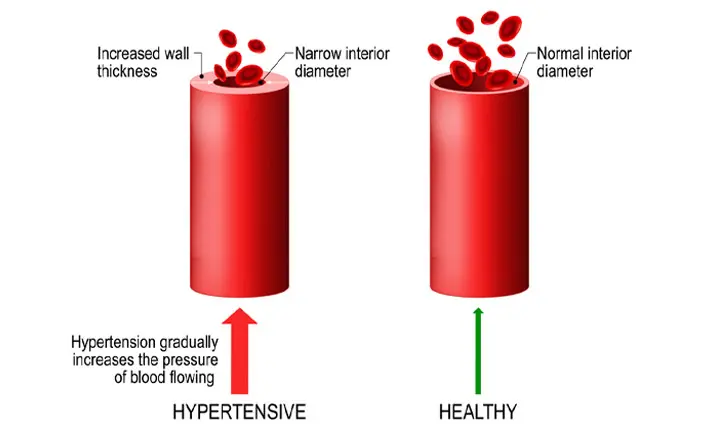A leading cause of death in Singapore
Hypertension, also known as high blood pressure, is a common medical condition in Singapore. According to Ministry of Health Singapore, 1 in 5 adults aged 18 – 69 years have high blood pressure. It is also one of the top 10 principal causes of death.
What exactly is blood pressure?
A blood pressure reading provides a set of 2 numbers namely systolic, which appears as the top number, and diastolic, which appears below. Systolic blood pressure refers to the pressure your blood is exerting against the artery wall when the heart contracts, while diastolic blood pressure indicates the pressure your blood is exerting against the artery wall when the heart relaxes.
Normal blood pressure for a healthy adult should be less than 120/80, though it should be noted that a person’s blood pressure will fluctuate throughout the day, based on their level of activity and/or emotional state. Generally, your blood pressure will increase when you are nervous, excited, stressed or physically active but you should see a doctor if your blood pressure readings are persistently higher than normal, based on the table below.
| Blood Pressure Level (mmHg) | ||
|---|---|---|
| Category | Systolic BP (mmHg) | Diastolic BP (mmHg) |
| Normal BP | <130 | <80 |
| High - Normal BP | 130 - 139 | 80 - 89 |
| Grade 1 Hypertension | 140 - 159* | 90 - 99 |
| Grade 2 Hypertension | 160* | 100 |
| Isolated Systolic Hypertension* | 140 | <90 |
To monitor your blood pressure, you should have it checked every time you visit a doctor.
How to check your blood pressure at home?
You can also consider investing in a digital home blood pressure monitor to check your blood pressure. They are simple to use, and you can speak to your doctor or pharmacist for further advice on how to use it correctly.
As a general rule, the best time to measure your blood pressure is when you are at rest and not stressed or agitated. To begin, seat yourself in a comfortable position, with your left arm resting on a table at approximately the same level as your heart. Wrap the cuff securely around the upper part of your bare arm, and press the button on the monitor to take your measurement.
How is high blood pressure treated?
To treat high blood pressure, your doctor is likely to recommend a combination of lifestyle changes as well as medication. While it can be tempting to take high blood pressure lightly because you feel well, uncontrolled high blood pressure can have serious consequences such as increasing your risk for stroke and damage to organs such as the heart, eyes and kidneys.
Medication
There are many different types of medications that can help to manage high blood pressure. For some patients, it may be necessary to take more than one type to achieve acceptable levels or your doctor may recommend a different type if you experience side effects.
Medications to treat high blood pressure include:
- Diuretics help to get rid of excess water and salt (sodium). As a result, you may urinate more frequently, or experience symptoms like dizziness and constipation.
- Beta blockers lower your heart rate and the heart’s output of blood. Some people may experience constipation or feel lightheaded or cold in their extremities.
- Calcium channel blockers help to relax and dilate blood vessels, and could lead to rapid heartbeat, shortness of breath and swelling of the lower legs and feet.
- Alpha blockers dilate the blood vessels and allow blood to flow more easily. In some patients, it can cause hypotension, headache, pounding heartbeat and nausea.
- Angiotensin converting enzyme (ACE) inhibitors prevent the formation of angiotensin II, which causes blood vessels to constrict. Common side effects include a dry cough, headache or dizziness.
- Angiotensin II receptor blockers (ARBs) block the action of angiotensin II at the blood vessel walls, and prevent the constriction of blood vessels. Possible side effects are headache, dizziness and light-headedness.
- Vasodilators relax the muscles in the vessel walls and could lead to side effects like fluid retention, headache, dizziness or rapid heartbeat.
As high blood pressure is a chronic condition, it is important to take your medication every day as recommended by your doctor. It can help to take it at the same time every day so that it becomes a daily habit. Should you forget a dose, you should take it as soon as you remember; if it is almost time for your next dose, take only one dose. You should not adjust the dosage on your own.
Dietary
The food you eat can affect your blood pressure too. Here is a simple guide to adjust your eating habits in support of achieving healthier blood pressure levels.
Eat less of:
- Salt (sodium). Cut back on high-sodium foods especially sauces like soy sauce, fish sauce and oyster sauce, and processed foods like salted meats.
- Fatty cuts of meat
- Alcohol, as large amounts consumed frequently raises blood pressure
Eat more of:
- Wholegrain foods such as brown rice, wholemeal bread, whole wheat biscuits and oats
- Protein like eggs, fish and lean meat as well as plant-based sources like beans, seeds and nuts.
- Fresh fruits and vegetables, which are rich in potassium to help counter the effect of sodium in your body.
Physical activity
Getting regular exercise is important for overall health, and being physically active will also help you to maintain a healthy body weight. This will support other measures to lower your blood pressure. Aim for 150 minutes of moderate-to-vigorous activity per week, with each session lasting at least 10 minutes.
When should I see a doctor?
Blood pressure that stays persistently 140/90 mmHg and above is considered high, and the person is said to have high blood pressure or hypertension. If you encounter this condition, it is best to consult a doctor to check on your health.













